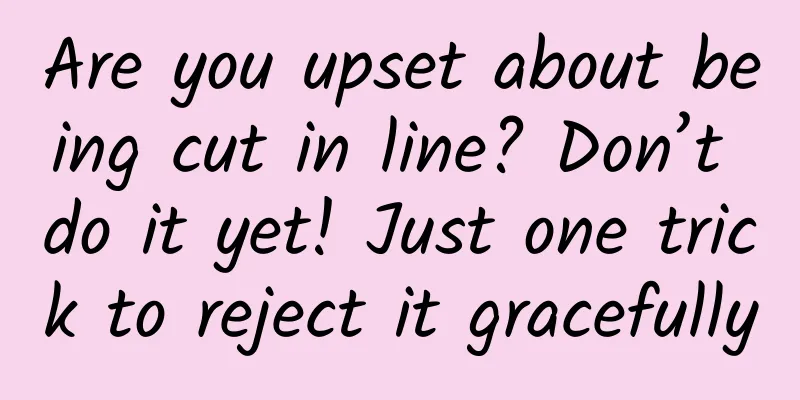Are you upset about being cut in line? Don’t do it yet! Just one trick to reject it gracefully

|
During the May Day holiday, a grandmother and her grandson tried to "jump the queue" at a scenic spot in Hengdian. After being stopped by a man in the queue behind them, the two sides started a fierce quarrel. During the quarrel, the grandmother and grandson's arrogant expressions and words were photographed and uploaded to the Internet by netizens, triggering condemnation of the grandmother and grandson. Copyright image, no permission to reprint Queuing in tourist attractions is already frustrating, and being cut in line adds fuel to the fire for many people. However, if excessive anger leads to physical impulses or makes things more troublesome, it will not be worth the loss. Why is queue-jumping so frustrating? How can we control our emotions when we encounter unfairness? What other interesting psychological facts are there about queue-jumping? This article will give you the answers. 01 Why was I “cut in line”? So infuriating? Humans are social animals and beneficiaries of social norms. Complying with and maintaining norms requires certain costs , such as the time cost of queuing. When those who cut in line gain benefits and enjoy services in advance, those who queue up obediently and abide by social norms will feel frustrated and have a conflict of choice between abiding by the norms and not abiding by them, which will cause inner anxiety and anger. Of course, if it is just the sense of fairness that is broken, it is not enough to make people angry. The emotional loss of control when being cut in line is also related to the negative experience while queuing . In fact, humans are a species that naturally hates queuing. MIT researcher Richard Larson and other researchers have confirmed through a large number of studies that queuers will have a faster pulse and higher blood pressure while waiting, and their emotions will become either excited or depressed. Especially when time is urgent, the anxiety will be more obvious. Copyright image, no permission to reprint At the same time, crowding can also cause strong emotions of anger. A large number of experiments have shown that an overly crowded environment will invade privacy and cause discomfort to people. What’s more, the waiting time in the queue is often an unknown. The unknown may disrupt our original plans and arrangements. This uncertainty will weaken our sense of control over time , increase the pressure of waiting, and make us feel irritated that we can't do anything. Waiting in line is already a bad feeling, and if you happen to encounter an annoying queue cutter, it is even more likely to lead to emotional breakdown or even physical conflict. 02 How to improve your success rate of "queue jumping" Most of the time, what people hate is the sense of unfairness brought about by being cut in line, rather than the act of cutting in line itself. A professor at Harvard Business School conducted an interesting social experiment in which people were asked to give money to people in line and then ask them to cut in line. The results showed that the more money people gave, the more willing they were to let others cut in line. This result is not surprising. Surprisingly, the more money people gave, the more willing they were to let others cut in line without paying a penny. The professor believes that when people find that someone is willing to pay a lot of money for an extremely simple thing, they will infer that this thing is very important to the person who paid the money, and then conclude that their own little sacrifice will bring huge value. Therefore, they would rather not charge money and take on social responsibilities. This shows that when people feel that being “cut in line” is helping others, they can even experience a “sense of moral improvement” in the act of agreeing to cut in line . Copyright image, no permission to reprint What's more, even if the queue-jumper finds a lame excuse, it can be easier to gain the understanding of others. Scientists such as Ellen Langer, a professor of psychology at Harvard University, conducted a much-cited study in which the experimenter tried to use some excuse to cut in line at the photocopier. One was a short, polite request with little rationale—“Excuse me, I have five pages, can I use the copy machine first?” This request allowed them to successfully cut in line 60% of the time , and when they added the fact that they were in a hurry, the success rate rose to 94% . Another more effective reason is "Can I use the copier because I need to make copies?" - even though this reason sounds unreasonable or even outrageous. It seems that our ears are indeed more pliable than we imagined. There are many other irrational phenomena about queue-jumping. According to a study conducted by American social psychologist Stanley Milgram, the person who is directly cut in line often determines whether queue-jumping will be allowed . If that person does not object, other people in the queue will tend to remain quiet, even if being "cut in line" harms their own interests. Milgram and other researchers also found that two people cutting in line at the same time is more likely to cause negative emotions than one person cutting in line, so if you want to cut in line, avoid acting in groups. Of course, the above is just some interesting psychological knowledge about queue-jumping. While making you laugh, it also helps us better understand human nature. When we return to reality, I hope everyone can still queue up in a civilized manner and abide by the order. 03 How to relieve anxiety when waiting in line If you want to ease the anxiety when waiting in line, the key is not to shorten the waiting time, but to make the waiting time less anxious, that is, to give passengers something to do while waiting . Houston Airport in the United States received a large number of complaints from passengers that the waiting time for baggage collection was too long. Therefore, the airport increased the number of baggage handlers to shorten the waiting time to 8 minutes, but passengers were still dissatisfied. Later, at the suggestion of psychologist Larson, the airport modified the walking route for passengers. Passengers originally walked for 1 minute after getting off the plane and waited for 7 minutes at the luggage carousel, but now they walk for 6 minutes and wait for 2 minutes. Copyright image, no permission to reprint A magical thing happened, these complaints disappeared almost overnight. This is because when passengers are walking, they have something to do, which is different from meaningless, static waiting, and will not make people feel anxious and irritable. If you encounter unreasonable queue-jumping behavior, you might as well gently but firmly remind the queue-jumper not to cut in line . The purpose of speaking loudly is to draw everyone's attention to him and make the other person feel ashamed. However, it should be noted that speaking loudly often leads to emotional intensification , so the voice should be as steady as possible, so as not to make the other person feel that he is being scolded, and to maintain a calm state of mind. Keep a tolerant attitude and don't get angry, otherwise it will only make the other party angry and often lead to more serious consequences. You must keep your heart calm. No matter what, the person who cuts in line is wrong, you just need to correct him. In short, mentality is the key to the queuing experience, just as Balzac said: "For those who are good at waiting, everything will come in time." So, what if we have to queue? Just wait patiently, and it will eventually be our turn. Finally, returning to this hot topic, the lack of management personnel to supervise the queue order is also a factor that leads to queue jumping. We should learn from experience and arrange management personnel to maintain queue order in public places with a large number of people in line to avoid such incidents from happening again. Author: Tang Yicheng, Deputy Director of Beijing Zhongke Popular Psychological Health Promotion Center Reviewer: Fan Chunlei, Associate Researcher, Institute of Psychology, Chinese Academy of Sciences The cover image and the images in this article are from the copyright library Reproduction of image content is not authorized |
<<: Scientists discover that plants can actually "talk"?
Recommend
WeChat 315 issued three warnings: No tolerance for violations
Today is March 15th. WeChat has issued a message ...
8 strategies to make your content marketing explode!
When I think of promoting content online, I imagi...
Google launches simplified Android system in India to develop low-end market
Google recently released a simplified version of ...
How to use the points system to stimulate user retention
A reasonable points system generally consists of ...
How to choose a TV at this stage? Don’t buy 4K, 1080p is the best
It's the TV buying season again, and the &quo...
The new mirror for the young lady? 360 Mobile Phone N6 Pro has a new way to play with the full screen
With the advent of full-screen phones, the strate...
Digging the root | Is picky eating a "bad habit"? Subverted! Picky eating may be a way for the immune system to protect the body!
gossip "If you don't eat, you won't ...
GAC Trumpchi GM8 debuts at Guangzhou Auto Show: Independent brand model targets Buick GL8
Many people may not have thought that GAC Trumpch...
Google Maps app update: COVID-19 reminders added to Android and iOS versions
Although the COVID-19 epidemic caused by the new ...
Renesas Electronics plans to acquire IDT for $6.7 billion, targeting autonomous driving and the Internet of Things
The development direction of digitalization, inte...
4 steps to quickly increase your conversion rate!
First of all, what is the growth we want to talk ...
It’s not an illusion: It’s really easier to gain weight after this age
May 11 is World Obesity Day. Obesity has become a...
Some people devote their whole lives to the classification of small yellow flowers
Ever since the "father" of biological t...
Channel promotion skills and conversion rate optimization solutions that money can’t buy
Today, I will share with you a few points mainly ...
National Health Commission: Patients visiting fever clinics need to undergo nucleic acid testing!
The National Health Commission issued a notice re...









